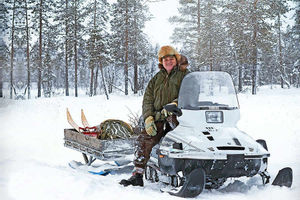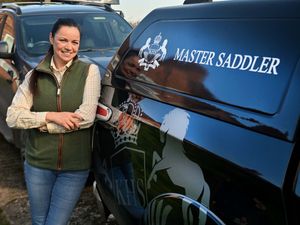Ray Mears chats ahead of his Tales of Endurance tour
Bushcraft expert Ray Mears thinks he's heard some tales of endurance in his time, but we've got a new one for him.

One all of our own: just try and get Ray Mears to give you a sneak preview of his forthcoming stage show. He's giving away absolutely nothing.
The survivalist, author and TV presenter is embarking on the Tales of Endurance tour in March. He will have to survive 24 audiences across the country, sharing stories that have inspired him over the years. It's a different challenge from, say, tracking wolves and bears in the wilderness. Yes he seems a little nervous.
"It's terrifying isn't it!" he laughs when we call. "I get to meet the viewers that watch the programmes I make and that's so nice. Very few people in television get that opportunity. I listen very carefully to what they tell me. You get a feeling from an audience, it's a very special thing."
Scaring audiences aside, we're keen to jump straight into it. What's the most frightening situation Ray has ever found himself in?
"Oh I don't know. It's difficult to say really, I don't really think in those terms." We're a bit disappointed, we wanted wild tales of derring-do, near-death experiences. And then he hits us with one: "The helicopter crash was obviously pretty dangerous. . . beyond my control."
The incident he's referring to happened back in 2005 when Ray was filming a documentary in Wyoming. The helicopter he and the crew were travelling in struck the ground, breaking open the fuel tank and badly injuring his colleague. Ray managed to escape unhurt.
"You're normally too busy dealing with stuff to worry," says Ray. "That's life. If you're on the road and some nutter decides to pull out in front of you, you don't have time to think 'oh my God, I'm about to die' do you? You're too busy steering out of the way."
For more information on upcoming events in the region click here
We refer instead to the times in which Ray has put himself into dangerous situations for his shows, tracking wildlife for example. But he interrupts: "Sorry, yes, but always with a lot of knowledge and respect. I always do my homework, I understand the animals and what they're likely to do. I always assume that they might do something uncharacteristic – they might have had a bad day. I'm always respectful to them, you'll never see me prod something or cause it any irritation. I treat animals in a way that I'd like to be treated myself."
With that, we are keen to find out more about Ray's adventures. He isn't that keen, it seems, to tell us: "Basically I'm going to talk about some stories that illustrate important knowledge about survival and how to be safe outdoors. Some of the things I'm going to talk about will be relevant to people taking a gap year.
"We've had some cases in recent years of people getting into trouble, you get a last telephone call and then they're gone because their battery dies. I want to see if I can help them to be safer, but without reducing the nature of the experience they put themselves through.
"I think these rites and journeys are very important. There's a degree of audience participation at one point, but there are also some astonishing stories. Stories of men and women who have done the most extraordinary things under the most extraordinarily difficult circumstances, which are heart-rending and very inspirational."
We wonder if there are any that stand out, that have driven Ray in his own journeys. "Yes there are," he says, sounding a little exasperated after a day of press calls, "but I'm not going to tell you them! You'll have to come along on the evening. I'm not going to tell you, you have to be there to find out."
There's also an opportunity for a Q&A. We secretly hope that in them, he gives away more than he's giving away to us today on the blower. We sulk a little bit. "I'm not being funny," he assures us, "there is good reason for me not telling you. If you read the stories, the way some people write about them, it means they miss the key points. I want to draw out of these stories things that we can learn about them, that are really important.
"But there is one story – can you imagine living in the Australian outback for 141 days without a fire and no training?"
We can't even imagine living 24 hours with no Android device, let alone being stuck in a country with snakes and spiders.
"One of the stories is of a man who managed to do that. The thing is, when you've heard these stories, you think 'gosh, if that person can do that, I can do anything'."
How does he seek out these tales, we wonder? "It's my job to know about these things. I pay attention to the stories I come across. But one of the things that is special is that I perceive the stories in a different way. Because I'm a professional in this field I don't see a story in the obvious tabloid way, I see it from a professional perspective. There are lessons that we can learn from these stories to help others who may find themselves in similar situations. Sometimes the real achievements go unnoticed.
"To be honest with you, when you hear the stories, it doesn't matter if you're going away or just dealing with stresses in your every day life. They are uplifting and make you realise that we're all more resilient than we know.
"Some of the stories are to do with people I've met who are no longer with us. Some of these individuals, when you talk to them you can't help but be moved and uplifted by their experiences, however horrific it was. It's a show for all ages, a great show for families to get together. You're going to learn the stories of people you haven't heard of before and I think the audience will agree with me that these are stories that need to be told.
"Our ability to find humour in times of adversity and to motivate ourselves by focusing on returning to our loved ones is astonishingly powerful. Stripped bare by adversity, survivors cling to the most fundamental emotions, instincts and human qualities. This in its own way can be an instructional guide to living outside of adversity.
"It's good to remember what people have done for us in the past."
Ray's tour opens at Shrewsbury's Theatre Severn on March 1. If you can't make it, don't worry, as it'll be passing through Birmingham Town Hall on March 12. For tickets and more information, visit here.
By Kirsty Bosley





